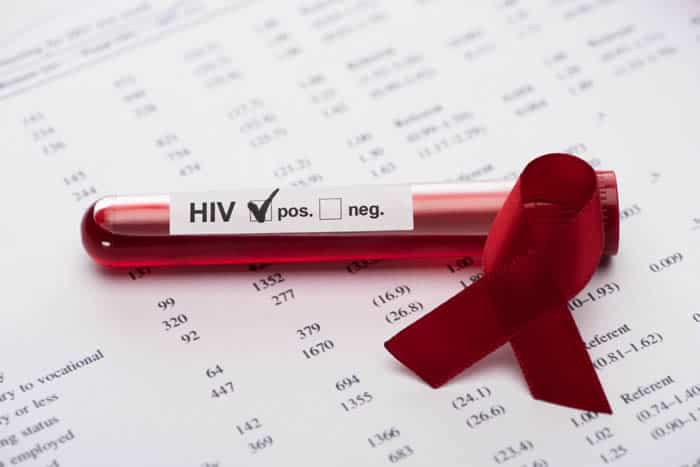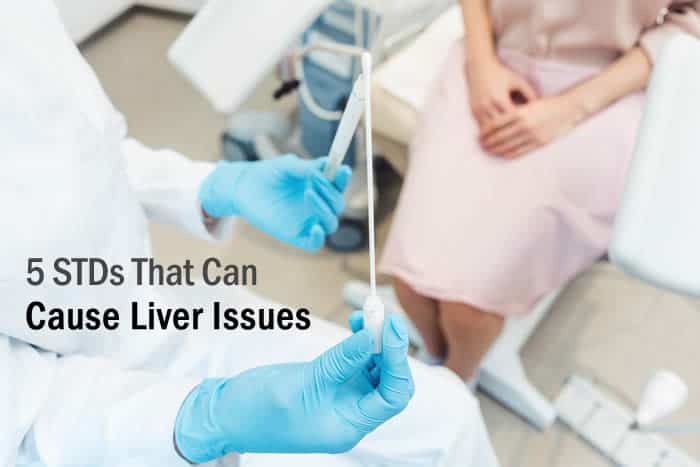
Previous
You Can Check Your Liver's Health At Home

Next
Exercise Moves & Yoga Poses Good for Liver Health
Liver Issues Caused By STDs
Did you know that some liver issues can be caused by certain sexually transmitted diseases (STDs)? Find out 5 STDs that can affect your liver.
In 2021, sexually transmitted diseases (STDs) reached a record high in the U.S. for both sexes and all demographic groups. (1) Not only can this category of conditions be uncomfortable to deal with, but they can lead to major health issues, some of which affect the liver. Here are a few liver issues that can be caused by STDs.
5 STDs That Can Cause Liver Issues
1. Chlamydia
Chlamydia is an STD that can affect both males and females. It is spread through vaginal, anal, or oral sex with an infected person. While it is typically symptomless, some people experience discharge from their vagina or penis and/or burning during urination with this STD. Men may also have pain or swelling in their testicles. (2)
Research indicates that chlamydia is one of the most common causes of Fitz-Hugh-Curtis syndrome, a condition involving inflammation of the liver capsule. (3) This syndrome commonly causes pain in the upper right side of the abdomen, which is due to the top surface of the liver being “stuck” to the abdominal wall.
Chlamydia is treatable with medication. Although, repeat infections are also common, making it important to retest roughly three months after being treated. (2)
2. Your Liver Can Be Affected By This STD: Gonorrhea
Gonorrhea is another STD that commonly leads to Fitz-Hugh-Curtis syndrome. (4) Like chlamydia, it can be transmitted via vaginal, anal, or oral sex with an infected person and has symptoms that include discharge, painful urination, and testicles that are painful or swollen. Gonorrhea can cause the genitals, rectum, or throat to become infected and is especially common in young adults aged 15 to 24. (5)
Gonorrhea can also be treated with medication. Although, some strains are drug-resistant—and these strains are increasing. (5) Therefore, it’s important to reach out to your healthcare provider if you’re being treated for this STD but your symptoms aren’t getting better.
3. Syphilis
If your partner has a syphilis sore and you come into contact with it during sex, you can get this sexually transmitted disease too.
Syphilis can also be spread from a mother to her unborn fetus.
What sets syphilis apart from some of the other STDs is that it has four stages. (6) During the first or primary stage, you may have sores. During the secondary stage, a non-itchy rash might appear, and there are typically no symptoms in the latent stage. The fourth stage, also known as the tertiary stage, can occur if syphilis goes untreated. It is the most serious as it can affect many of the body’s organ systems.
It is in the secondary stage that the liver can be impacted, leading to syphilitic hepatitis. While rare, this condition increases liver enzymes and is often accompanied by symptoms such as rash, fatigue, fever, abdominal pain, headache, and sore throat. (7)
Syphilis can be treated with antibiotics. However, if the infection has caused damage, treatment may not reverse these effects. (6)
4. HIV Is Another STD That Can Affect Your Liver

Human immunodeficiency virus (HIV) is a virus that attacks cells that fight infection, making people with this STD more prone to diseases and other infections. If HIV goes untreated, it can lead to AIDS (acquired immunodeficiency syndrome).
Liver-related diseases are one of the top causes of non-AIDS-related deaths in people with HIV. (8) This is due, in part, to oxidative stress and injury due to a poor-functioning immune system. But liver damage can also occur as a result of HIV medications, leading to liver toxicity. (9)
While there is currently no cure for HIV, this disease can be managed with treatment.
5. Hepatitis
Hepatitis is liver inflammation caused by a virus. There are five types of hepatitis: A, B, C, D, and E. Though not classified as STDs, types A, B, and C can all be spread through sexual contact, though to varying degrees.
Hepatitis A can be spread through oral contact with feces, hepatitis B can be spread through almost any type of sexual activity with an infected person, and hepatitis C is least likely to be transmitted sexually. (10)
Hepatitis A and acute hepatitis B will both generally go away on their own, though good nutrition, hydration and bed rest may be advised. Hepatitis C is often treated with antiviral medications. These medications are typically effective at treating the virus.
Protect Yourself from STDs & Liver Issues
As liver issues can be caused by some STDs, it’s important to take precautions to protect yourself from STDs which, in turn, can help protect you from liver issues. Eating healthy foods, exercising regularly, and avoiding toxins also support healthy liver function.
So too can certain dietary supplements. Natural Wellness offers a variety of liver-supportive supplements designed to help this important organ function at optimal levels.
(1) U.S. Department of Health and Human Services. (2023, June 7, 2023). Sexually Transmitted Infections (STIs). Retrieved June 09, 2023, from https://www.hhs.gov/programs/topic-sites/sexually-transmitted-infections/index.html
(2) Centers for Disease Control and Prevention. (2022, April 12). Chlamydia: Basic Fact Sheet. Retrieved June 09, 2023, from https://www.cdc.gov/std/chlamydia/stdfact-chlamydia.htm
(3) Ekabe, C., Kehbila, J., Njim, T., et al. (2017, January 03). Chlamydia Trachomatis-Induced Fitz-Hugh-Curtis Syndrome: A Case Report. BMC Research Notes. doi:10.1186/s13104-016-2357-z
(4) Rueda, D., Aballay, L., Orbea, L., et al. (2017, December 29). Fitz-Hugh-Curtis Syndrome Caused by Gonococcal Infection in a Patient with Systemic Lupus Erythematous: A Case Report and Literature Review. American Journal of Case Reports. doi:10.12659/AJCR.906393
(5) Centers for Disease Control and Prevention. (2022, August 22). Gonorrhea: Basic Fact Sheet. Retrieved June 09, 2023, from https://www.cdc.gov/std/gonorrhea/stdfact-gonorrhea.htm
(6) Centers for Disease Control and Prevention. (2022, February 10). Sexually Transmitted Diseases (STDs): Basic Fact Sheet. Retrieved June 09, 2023, from https://www.cdc.gov/std/syphilis/stdfact-syphilis.htm
(7) Alemam, A., Ata, S., Shaikh, D., et al. (2021, May 02). Syphilitic Hepatitis: A Rare Cause of Acute Liver Injury. Cureus. doi:10.7759/cureus.14800
(8) Kaspar, M., Sterling, R. (2017, October 26). Mechanisms of Liver Disease in Patients Infected with HIV. BMJ Open Gastroenterology. doi:10.1136/bmhgast-2017-000166
(9) National Institutes of Health. (2021, August 19). Side Effects of HIV Medicines. Retrieved June 09, 2023, from https://hivinfo.nih.gov/understanding-hiv/fact-sheets/hiv-and-hepatotoxicity
(10) American Sexual Health Association. (n.d.). Hepatitis: Fast Facts. Retrieved June 09, 2023, from https://www.ashasexualhealth.org/hepatitis/







